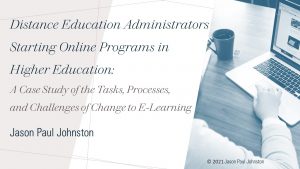Top Picks for adding Learning Games to your Classroom or Course
Can We Learn Through Play?
There is a lot of talk in the education world in the last few years about leveraging games for instruction. Professor James Gee is quoted as saying, “Games are goal-directed learning Spaces” (Hoffmann, 2009, p.21). There is no doubt that computer gaming is ubiquitous among students. The rationale for adding instructional gaming into the classroom is that the teacher can connect with the student in a place of interest. This could be particularly helpful with less engaging subjects or content which demands frequent repetition to learn. Research is even showing how games can help build relationships. (And the Community of Inquiry theory has shown us how essential the social presence is in the classroom.)
Games in Higher Ed
The main focus, as one might expect, are games focused on primary aged students who already spend countless hours gaming on computers, tablets and other devices. Gaming can also be instructive in higher education. A teacher will need to be thoughtful regarding how many of the games will be designed toward the younger student (you don’t want to insult the adults in your doctoral program!). At the same time, you may be surprised how even adults might enjoy a break from the usual, even if they do feature fuzzy animals.
Some games below are more “drill and practice” games that instructors can create with more concrete information from their classes. Others will take the students into higher orders of thinking, empathy and understanding by putting them through simulations (CBC report, “Could Video Games Be the Key to World Peace?“).
My Top Picks for Online Learning Games
Here are my top picks for games that can be used for learning in the face to face or online classroom (note, many of these games require flash and so will not work in some browsers and mobile devices). Of course, please review all content before passing onto students as some may not be appropriate for some audiences:
Drill and Practice Games / Flash Cards
To be useful, most of these will need information from the instructor:
- https://www.sporcle.com/
- https://www.socrative.com/
- https://quizlet.com/
- https://getkahoot.com/
- https://www.studyblue.com/
Simulation Games
- Dealing with grief and cancer: http://www.thatdragoncancer.com/ (and the related Ted talk with Amy Green: https://www.ted.com/talks/amy_green_a_video_game_to_cope_with_grief )
- Orwell – government privacy control: http://www.surpriseattackgames.com/portfolio-items/orwell/
- Empathy toward
- those in a revolution: http://inkstories.com/1979revolutiongame/
- or war https://www.thiswarofmine.com/
- 3rd World Farmer: http://3rdworldfarmer.com/
- Eliza the Rogerian psychotherapist emulator: http://www.manifestation.com/neurotoys/eliza.php3
- Depression Quest – an interactive simulator about living with depression: http://www.depressionquest.com/dqfinal.html
- People Power – civil unrest and protesting: http://www.peoplepowergame.com/download/ (PC download – interesting idea but very dated)
- World Issues http://www.darfurisdying.com/
- Fast food dangers: http://www.mcvideogame.com/
- Making Peace in the Middle East http://www.peacemakergame.com/
- List of Games for Change: http://www.gamesforchange.org/play/
- Neocolonialism: http://store.steampowered.com/app/333540/Neocolonialism/
Games for Good
- http://www.seaheroquest.com/en Helps in dementia research
- United Nations Games: https://www.unric.org/en/games
- Donate rice for correct answers: http://freerice.com/category
The Need to Evaluate Games
Just because a game is interesting or engaging doesn’t mean that it should be used for learning. Every instructor must evaluate games to ensure that they line up with their learning objectives and don’t distract or delay classroom goals. Here is my Prezi video regarding evaluating online games for the classroom. Here are the main evaluation questions I pose in that Prezi regarding a potential educational game:
- Does it tend towards simple stimulus response or does it build higher order thinking in the learner? (Egenfeldt-Nielsen, 2007)
- Is it consistent with the Curriculum and learning outcomes? (Goyne, McDonough & Padgett, 2000, p.345)
- Does the Software Provide Positive, Formative Feedback and Achievement Measures? (Goyne, McDonough & Padgett, 2000, p.346)
- Is the Software Appropriately Challenging? (Goyne, McDonough & Padgett, 2000, p.346)
- Does the Software Provide Opportunities for Practice and Review? (Goyne, McDonough & Padgett, 2000, p.346)
- Does the Software Present Material in an Enjoyable, Interesting Manner? (Goyne, McDonough & Padgett, 2000, p.347)
- Will the Software Allow for Social Interaction? (Goyne, McDonough & Padgett, 2000, p.347)
- Will the Software Foster Learning in an Authentic, Relevant Context? (Goyne, McDonough & Padgett, 2000, p.347)
- Will the Software Be Accessible to Students? (Goyne, McDonough & Padgett, 2000, p.347)
In Conclusion
No software can replace teachers who thoughtfully plan objectives and authentically challenge and guide learners to greater heights. Educational computer games can be used to enhance learning like any other tool effectively used from the teacher’s technology tool box. Will this be game over for you as a teacher or are you willing to fight to take your instruction to the next level?
Try this link for even more educational gaming information and examples:
References
Egenfeldt-Nielsen, S. (2007). Third generation educational use of computer games. Journal of Educational Multimedia and Hypermedia, 16(3), 263-281.
Goyne, J. S., McDonough, S. K., & Padgett, D. D. (2000). Practical guidelines for evaluating educational software. The Clearing House, 73(6), 345-348.
Hoffmann, L. (2009). Learning Through Games. Communications Of The ACM, 52(8), 21-22.
Johnston, J. P. (2014). ET5063 Module 4 Application: Overview: Preparing a Staff Development Presentation. Unpublished paper, American College of Education, Indianapolis, IL.
Kiili, K., & Lainema, T. (2008). Foundation for measuring engagement in educational games. Journal of Interactive Learning Research, 19(3), 469-488.
Panoutsopoulos, H., & Sampson, D. G. (2012). A study on exploiting commercial digital games into school context. Journal of Educational Technology & Society, 15(1), 15-n/a.
Petsche, J. (2011). Engage and excite students with educational games. Knowledge Quest, 40(1), 43-44.
Takeuchi, L. M., & Vaala, S. (2014). Level up Learning: A National Survey on Teaching with Digital Games. Joan Ganz Cooney Center. Retrieved from http://www.joanganzcooneycenter.org/wp-content/uploads/2014/10/jgcc_leveluplearning_final.pdf
Virvou, M., Katsionis, G., & Manos, K. (2005). Combining software games with education: Evaluation of its educational effectiveness. Journal of Educational Technology & Society, 8(2)



